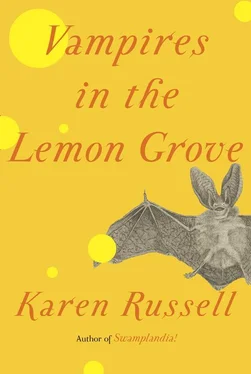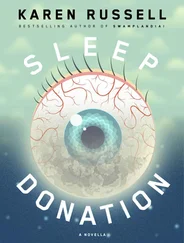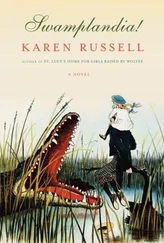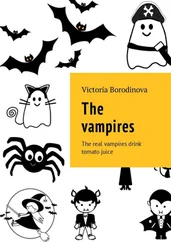It was at precisely this moment that the Recruitment Agent arrived at our door.
The Agent visited after a thundershower. He had a parasol from London. I had never seen such a handsome person in my life, man or woman. He had blue eyelids, a birth defect, he said, but it had worked out to his extraordinary advantage. He let me sniff at his vial of French cologne. It was as if a rumor had materialized inside the dark interior of our farmhouse. He wore Western dress. He also had — and I found this incredibly appealing — mid-ear sideburns and a mustache.
“My father is sick,” I told him. I was alone in the house. “He is in the other room, sleeping.”
“Well, let’s not disturb him.” The Agent smiled and stood to go.
“I can read,” I said. For years I’d worked as a servant in the summer retreat of a Kobe family. “I can write my name.”
Show me the contract, I begged him.
And he did. I couldn’t run away from the factory and I couldn’t die, either, explained the Recruitment Agent — and perhaps I looked at him a little dreamily, because I remember that he repeated this injunction in a hard voice, tightening up the grammar: “If you die, your father will pay.” He was peering deeply into my face; it was April, and I could see the rain in his mustache. I met his gaze and giggled, embarrassing myself.
“Look at you, blinking like a firefly! Only it’s very serious—”
He lunged forward and grabbed playfully at my waist, causing my entire face to darken in what I hoped was a womanly blush. The Agent, perhaps fearful that I was choking on a radish, thumped my back.
“There, there, Kitsune! You will come with me to the model factory? You will reel for the realm, for your emperor? For me, too,” he added softly, with a smile.
I nodded, very serious myself now. He let his fingers brush softly against my knuckles as he drew out the contract.
“Let me bring it to Father,” I told the Agent. “Stand back. Stay here. His disease is contagious.”
The Agent laughed. He said he wasn’t used to being bossed by a joko . But he waited. Who knows if he believed me?
My father would never have signed the document. He would not have agreed to let me go. He blamed the new government for my grandfather’s death. He was suspicious of foreigners. He would have demanded to know, certainly, where the factory was located. But I could work whereas he could not. I saw my father coming home, cured, and finding the five-yen advance. I had never used an ink pen before. In my life as a daughter and a sister, I had never felt so powerful. No woman in Gifu had ever brokered such a deal on her own. KITSUNE TAJIMA, I wrote in the slot for the future worker’s name, my heart pounding in my ears. When I returned it, I apologized for my father’s unsteady hand.
On our way to the kaiko -tea ceremony, I was so excited that I could barely make my questions about the factory intelligible. He took me to a summer guesthouse in the woods behind the Miya River, which he told me was owned by a Takayama merchant family and, at the moment, empty.
Something is wrong , I knew then. This knowledge sounded with such clarity that it seemed almost independent of my body, like a bird calling once over the trees. But I proceeded, following the Agent toward a dim staircase. The first room I glimpsed was elegantly furnished, and I felt my spirits lift again, along with my caution. I counted fourteen steps to the first landing, where he opened the door onto a room that reflected none of the downstairs refinement. There was a table with two stools, a bed; otherwise the room was bare. I was surprised to see a large brown blot on the mattress. One porcelain teapot. One cup. The Agent lifted the tea with an unreadable expression, frowning into the pot; as he poured, I thought I heard a little splash; then he cursed, excused himself, said he needed a fresh ingredient. I heard him continuing up the staircase. I peered into the cup and saw that there was something alive inside it — writhing, dying — a fat white kaiko . I shuddered but I didn’t fish it out. What sort of tea ceremony was this? Maybe, I thought, the Agent is testing me, to see if I am squeamish, weak. Something bad was coming — the stench of a bad and thickening future was everywhere in that room. The bad thing was right under my nose, crinkling its little legs at me.
I pinched my nostrils shut, just as if I were standing in the mud a heartbeat from jumping into the Miya River. Without so much as consulting the Agent, I squinched my eyes shut and gulped.
The other workers cannot believe I did this willingly. Apparently, one sip of the kaiko -tea is so venomous that most bodies go into convulsions. Only through the Agent’s intervention were they able to get the tea down. It took his hands around their throats.
I arranged my hands in my lap and sat on the cot. Already I was feeling a little dizzy. I remember smiling with a sweet vacancy at the door when he returned.
“You — drank it.”
I nodded proudly.
Then I saw pure amazement pass over his face — I passed the test, I thought happily. Only it wasn’t that, quite. He began to laugh.
“No joko ,” he sputtered, “not one of you, ever—” He was rolling his eyes at the room’s corners, as if he regretted that the hilarity of this moment was wasted on me. “No girl has ever gulped a pot of it!”
Already the narcolepsy was buzzing through me, like a hive of bees stinging me to sleep. I lay guiltily on the mat — why couldn’t I sit up? Now the Agent would think I was worthless for work. I opened my mouth to explain that I was feeling ill but only a smacking sound came out. I held my eyes open for as long as I could stand it.
Even then, I was still dreaming of my prestigious new career as a factory reeler. Under the Meiji government, the hereditary classes had been abolished, and I even let myself imagine that the Agent might marry me, pay off my family’s debts. As I watched, the Agent’s genteel expression underwent a complete transformation; suddenly it was as blank as a stump. The last thing I saw, before shutting my eyes, was his face.

I slept for two days and woke on a dirty tatami in this factory with Dai applauding me; the green thread had erupted through my palms in my sleep — the metamorphosis unusually accelerated. I was lucky, as Chiyo says. Unlike Tooka and Etsuyo and so many of the others I had no limbo period, no cramps from my guts unwinding, changing; no time at all to meditate on what I was becoming — a secret, a furred and fleshy silk factory.
What would Chiyo think of me, if she knew how much I envy her initiation story? That what befell her — her struggle, her screams — I long for? That I would exchange my memory for Chiyo’s in a heartbeat? Surely this must be the final, inarguable proof that I am, indeed, a monster.
Many workers here have a proof of their innocence, some physical trace, on the body: scar tissue, a brave spot. A sign of struggle that is ineradicable. Some girls will push their white fuzz aside to show you: Dai’s pocked hands, Mitsuki’s rope burns around her neck. Gin has wiggly lines around her mouth, like lightning, where she was scalded by the tea that she spat out.
And me?
There was a moment, at the bottom of the stairwell, and a door that I could easily have opened back into the woods of Gifu. I alone, it seems, out of twenty-two workers, signed my own contract.
“Why did you drink it, Kitsune?”
I shrug.
“I was thirsty,” I say.

Roosters begin to crow outside the walls of Nowhere Mill at five a.m. They make a sound like gargled light, very beautiful, which I picture as Dai’s red and Gin’s orange and Yoshi’s pink thread singing on the world’s largest reeler. Dawn. I’ve been lying awake in the dark for hours.
Читать дальше













